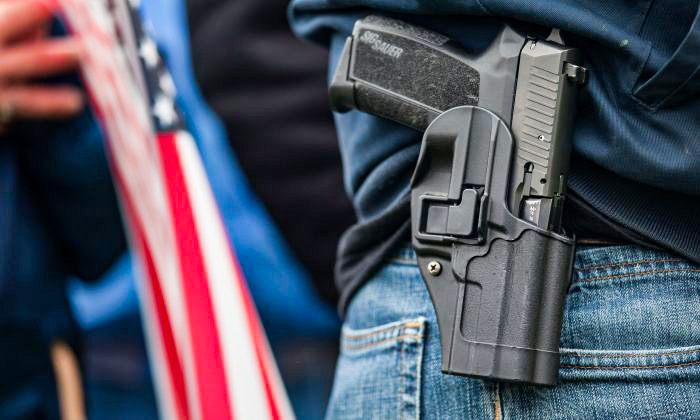A judge in New York has ruled that the state’s extreme risk protection order law, which allows law enforcement to temporarily seize a person’s firearms, is unconstitutional.
Extreme risk protection order (ERPO) laws, often referred to as “Red Flag” laws, allow courts to order the seizure of a person’s firearms if a police officer, district attorney, family member, or school administrator files a petition indicating the targeted firearms owner poses a risk of harm to themselves or others. In a Tuesday decision, Orange County Judge Craig Stephen Brown determined that the wording of New York’s Red Flag application requirements fall short of an existing New York state law, which stipulates that a person’s liberties cannot be curtailed on the basis of a belief that they pose a threat to themselves or others unless a physician attests that the targeted person is suffering from a condition “likely to result in serious harm.”
Judge Brown was asked to consider the legalities of the state’s Red Flag law by attorneys for defendant Corey J Monroe. Monroe was subjected to a Red Flag firearms seizure order after he was alleged to have brandished and pointed a loaded shotgun at his neighbor during a verbal dispute. Monroe denied the allegations and called on the judge overseeing his case to throw out the Red Flag order against him, which was filed by a Middletown Police Department officer.
Brown agreed to vacate the Red Flag order against Monroe, and ruled that the law is unconstitutional.
“Under Mental Hygiene Law § 9.39, a person’s liberty rights cannot be curtailed unless a physician opines that the person is suffering from a condition ‘likely to result in serious harm.’ Further, in order to extend any such curtailment of liberty beyond 48 hours, a second doctor’s opinion must be obtained and such opinion must be consistent with the first doctor’s opinion,” Brown wrote in his judgement (pdf). “Absent from New York’s Red Flag Law is any provision whatsoever requiring even a single medical or mental health expert opinion providing a basis for the order to be issued. New York’s Red Flag Law, as currently written, lacks sufficient statutory guardrails to protect a citizen’s Second Amendment Constitutional right to bear arms.”
In addition to having the Red Flag gun confiscation order against him thrown out, Monroe also beat the allegations of pointing a firearm at his neighbor in a related criminal proceeding.
Ramifications For New York State’s Law
Brown’s ruling against New York’s Red Flag law could impact other cases involving people who have had their firearms seized under the legislation.
In a telephone interview with NTD News, Brittany Kessler, the attorney who represented Monroe in the effort to throw out the ERPO against him, said the state’s Red Flag law “was written pretty poorly, and it’s infringing on people’s constitutional rights.”
“I strongly believe in … protecting citizens’ constitutional rights. And that statute, the red flag laws do not do any sort of such a thing,” Kessler added.
Kessler said her petition in Monroe’s case was the first time she had challenged the constitutionality of New York’s Red Flag law, but that she had filed similar petitions on behalf of other individuals who had their firearms seized under the state’s law, and had seen similar rulings in Monroe and Westchester county courts.
She said an appellate court could potentially overturn Brown’s decision, but that she has yet to see any of the rulings against the state’s Red Flag laws go before the state’s appellate court division.
Red Flag Laws Across The Country
Some 19 U.S. states and the District of Columbia currently have extreme risk or Red Flag laws in effect.
Proponents of such laws have argued that they can help prevent gun violence by allowing petitioners to raise concerns about warning signs that a person might show prior to killing themselves or others with a firearm.
“In many instances of gun violence, there are clear warning signs that the shooter posed a serious threat before the shooting. Extreme Risk laws give key community members a way to intervene before warning signs become tragedies,” the gun-control advocacy organization Everytown For Gun Safety claims on its website.
Opponents of Red Flag laws argue that such legislation can deprive gun owners of their property and their Second Amendment right to bear arms without a criminal conviction, and that, in a politically charged environment, unpopular political views could be used as justification for the filing of petitions to request Red Flag gun confiscations.
“Aside from allowing run-of-the-mill malicious actors to indulge personal grudges against law-abiding gun owners, in the current politically-charged environment these laws enable the government to target those with First Amendment-protected political views the government disfavors,” the National Rifle Association’s Institute For Legislative Action (NRA-ILA) argued in a June 2022 statement.

